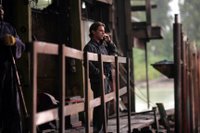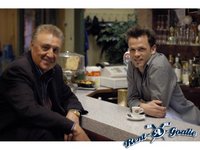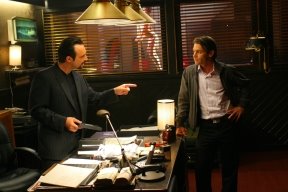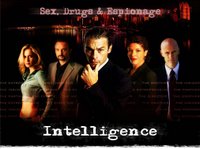After the evil trick of taking House off the air in order to show some trivial sporting event, Fox finally gave us a Halloween treat with the first new episode in over a month. And call me a fool, but I loved it.
"Fools for Love" provided a sustained dose of witty dialogue that made me realize how unique this drama's particular comedic tone is, and how much I miss it when it's gone. There were some misses ("What?" "It's got an ass. Technically that makes it a who."), but the quantity of jokes, and the average that hit their target, was incredibly high. Even the often neglected Chase got in on the fun, with some great lines, like "Give it up. Foreman and Cameron are too ethical. And I'm too scared of being sued."
The fools of the week are 20-year-old Mr. and Mrs. Dawson, who start the episode by being victims of an armed robbery and attempted rape, which Jeremy risks his life to stop, then starts bashing the attempted rapist's head in. When Tracy start to gasp for breath, he turns his attention to his wife.
House, on the other hand, has some trouble paying attention to his new patient. While Cameron desperately tries to keep the conversation focused on Tracy's throat swelling, House spots Wilson talking to a babe in the hallway and is obsessed with finding out the differential diagnosis on Wilson's love life.
After using his famous people repelling skills to get Wendy the Peds Nurse Babe to flee, House chastises Wilson about moving on to another bad relationship after three failed marriages and an affair with a patient. Wilson denies any interest in Wendy the Peds Nurse Babe, and also accuses House of wanting Wilson to fail at relationships so he's always available to hang out. I'm not sure House needs an ulterior motive to want someone else to be miserable, but anything's possible.
With step one of his plan to torment Wilson complete, House finally listens to his minions, determines a possible diagnosis, and decides to test Tracy for stress-induced anaphylaxis. While she's panting away on a treadmill, her husband starts to exhibit the same abdominal pain she had and becomes patient of the week number two.
House meets patient number three in the clinic, but this one seems immune to House's anti-charms, which are in full rude force. Michael Tritter (guest star David Morse) insists on being tested for an infection on his, er, private parts, after House makes one of his possibly brilliant, possibly lazy diagnoses based on the fact that the patient is chewing nicotine gum, which dehydrates him, which means friction does, um, bad things to the private parts. "Try a lubricant. Or foreplay, if you're cheap," is House's prescription.
People who hadn't gone near a TV listing in the past month, or read an article about David Morse joining the cast for a six-episode arc, might have had some delayed gratification on this, but those of us who knew the character was a cop could have seen it as a bit of clever dialogue:
Tritter: You're rude.
House: Wow, you're like a detective or something.
Tritter: And you're smart. And you're funny. But you are bitter, and you're lonely, so you treat everyone around like they're idiots, and you get away with it, because of your cane.
See, if House paid attention to the signs, like the fact that the interrupted dialogue gives a clue that he is, in fact, a detective, or the subtle hint of the guy's profession being written in his chart, House might have realized he's pissing off a cop.
Tritter even trips the poor, crippled doctor, and House's surprise that his cane isn't his get out of jail free card this time is evident on that expressive Hugh Laurie face.
Morse plays the role with a quiet menace, which so far is a much more effective contrast and antagonist to Laurie's often-theatrically acerbic Dr. House than the caricature board chair Vogler, played by Chi McBride in the first season, or last season's ex-love Stacy, played by Sela Ward - though that was largely because it's hard to buy into an antagonist when you know they really want to jump each other.
And I know he's had a million roles since then, but it's a bit of a shock to someone who remembers Morse fondly as the sweet Dr. Boomer. Tritter is not what I would call sweet, but it's hard not to think that House deserves a little of the sweet revenge the cop threatens after House "forgets" to remove the rectal thermometer he inserts following the reluctantly administered swab test. If "No Reason"'s Moriarty couldn't get House to be nicer to patients permanently because it's the right thing to do, maybe the threat of getting the crap beaten out of him will do it.
Of course it won't, and it would ruin the show if it did, but we've got the promise of a very interesting battle of wills here, at least. Though Cuddy makes House promise to apologize, and Tritter confronts him to bully an apology out of him, House the bully naturally refuses.
When Foreman and Chase find condoms in the young couple's apartment, Chase and House think Jeremy must be cheating on his birth-control-taking wife. Foreman's belief in their devotion to each other is vindicated when it turns out they really did just want to be extra cautious, and test negative for STDs. When Tracy lapses into a coma and scans show she has lesions on her brain, House wants to do a risky brain stem biopsy with the husband's consent.
Cameron decides that the husband has a conflict of interest, since the dangerous biopsy could also benefit his case, so he shouldn't be involved in making the decision. Of all ethical stances to take, that one seems pretty far over on the side of playing by the rules for someone lets House get away with far worse, and who crosses ethical lines herself.
It feels like a contrived plot point, with Cameron the victim of the necessity for an obstacle. But it passes relatively quickly when the husband makes an unexpected choice: he wants to stop treatment so he'll deteriorate, they can biopsy his brain instead, and still have time to save her. Don't think Foreman, determined to believe in love without being sappy about it, doesn't gloat a little at that evidence.
But when House finds out the couple were childhood sweethearts, next door neighbours who eloped because Jeremy's father objected to their relationship and got violent, the clues finally add up for him. Their symptoms fit those of a rare genetic disease, the couple share striking green eyes, and the father might have been upset about something entirely different than the fact that Jeremy is white and Tracy is black, like the fact that his son and illegitimate daughter were getting on a little too well.
Once you get over the fact that it's a classic soap opera reveal, it's an effective plot twist for a medical case, and, though I may be clueless, one I didn't see coming. The red herring of racism throughout the episode was a nice touch, adding a little depth without simply providing an excuse for a mini ethical debate about the subject. And with mistaken paternity rates estimated at 5 to 10% - meaning up to 10 percent of us think our biological fathers are someone other than the real DNA donor - it also seems no more far fetched than any other bizarre case that would come before House and his team.
Foreman argues that they should withhold the information about the genetic connection, an argument that's slightly compromised when House points out that they'd have to keep them away from doctors, the Internet, and people who aren't idiots. Plus, Foreman - ick.
"Tell them or I will," House says, and Foreman recognizes that as the horrible threat it is. Remember how House told the model in "Skin Deep" that she was a he, then think about how he would be likely to tell this husband and wife that they're brother and sister.
Last season's two-part "Euphoria" was Omar Epps' showcase episode, but it's the more subtle empathy coupled with the casual arrogance of an episode like this that better shows his acting chops for me. He tells them gently, and watches helplessly at their despair and disgust when his attempts to reassure them they're not brother and sister in any way that matters fail.
In a musical montage, we discover that poor sad Wilson is staying in a hotel, and poor sad Cuddy is testing negative, and therefore heroically putting up with House's taunts about being pregnant without gouging his eyes out. Before that, we discover that it's Foreman, not Wilson, who's dating Wendy the Peds Nurse Babe, and so he wins the $200 bet House put on Wilson lying about the affair. Way to go Foreman - on both counts.
It's only at the end of the episode that House learns what his revenge-seeking clinic patient does for a living. Tritter pulls him over for speeding on his motorcycle, and having done his own deductions about House from their encounters, decides to search him on suspicion of narcotics possession.
Of course there's a stash of pills in House's jacket pocket. Proving he's got freakish insight into House's character after two brief meetings, Tritter dismisses House's suggestion that a cripple working in a hospital wouldn't have any trouble getting a prescription. "Arrogant son of a bitch like you, I bet you didn't bother." That pretty much sums up House's MO for a lot of his actions, and from a few episodes back, we know Tritter is right.
While House's over the top moments are usually highlights of an episode, the subtlety of Hugh Laurie's "holy crap I'm in trouble" face at the end proves again that sometimes the most effective acting comes from the quieter moments.
I can't imagine how House's is going to get out of this. Apparently, neither can he. I doubt we'll find out the answer next week, but Tuesday, Nov. 7 at 9 p.m. on FOX is our chance to see Morse and Laurie go toe to cane again.








